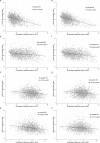The pervasive association between political ideology and COVID-19 vaccine uptake in Brazil: an ecologic study
- PMID: 37612648
- PMCID: PMC10464231
- DOI: 10.1186/s12889-023-16409-w
The pervasive association between political ideology and COVID-19 vaccine uptake in Brazil: an ecologic study
Abstract
Background: Despite the unequivocal benefits of vaccination, vaccine coverage has been falling in several countries in the past few years. Studies suggest that vaccine hesitancy is an increasingly significant phenomenon affecting adherence to vaccines. More recently, during the COVID-19 pandemic, political views have emerged as an additional influencing factor for vaccine hesitancy.
Methods: In this ecologic study, we used information from publicly available databases to investigate the association between political ideology, depicted by the percentage of votes for the right-wing candidate Jair Bolsonaro in the presidential elections of 2018 and 2022, and COVID-19 vaccination in Brazilian municipalities. The primary endpoint was the COVID-19 vaccination index, calculated as the number of COVID-19 vaccine doses administered up to September 2022 divided by the number of inhabitants in each municipality. The analysis was conducted using Pearson correlation coefficients and linear regression models adjusted for HDI, the percentage of male voters, the percentage of voters who were older than 50 years old, and the percentage of voters with a middle school education or less. In addition, we explored whether the effect of the percentage of Bolsonaro voters on the COVID-19 vaccination index was modified in different quartiles of HDI using an interaction term.
Results: Five thousand five hundred sixty-three Brazilian municipalities were included in the analysis. For both the 2018 and 2022 elections, the percentage of votes for Jair Bolsonaro was significantly and inversely associated with COVID-19 vaccine uptake after adjustment for the sociodemographic characteristics of the voters (change in mean vaccination index in 2018 for each 1% increase in Bolsonaro voters -0.11, 95% confidence interval [CI] -0.13 to -0.08, p < 0.001; change in mean vaccination index in 2022 for each 1% increase in Bolsonaro voters -0.09, 95% CI -0.11 to -0.07, p < 0.001). We also found a statistically significant interaction between the primary predictor of interest and HDI scores, with a more significantly detrimental effect of the right-wing political stance in municipalities in the lower HDI quartiles (interaction p < 0.001 for the first HDI quartile; p = 0.001 for the second HDI quartile).
Conclusion: Our findings suggest that political ideologies have influenced COVID-19 vaccine hesitancy in Brazilian municipalities, affecting communities inequitably. The politicization of vaccines is a new challenge for vaccine programs. Strategies to face these challenges should include joint efforts from governments and civil society for a common public health goal.
Keywords: COVID-19; COVID-19 vaccines; Health policy; Human development; Mass vaccination; Political factors; Politics; Public health; Socioeconomic factors; Vaccination hesitancy.
© 2023. BioMed Central Ltd., part of Springer Nature.
Conflict of interest statement
The authors declare no competing interests.
Figures
References
-
- Domingues CMAS, Teixeira AM da S. Coberturas vacinais e doenças imunopreveníveis no Brasil no período 1982–2012: avanços e desafios do Programa Nacional de Imunizações. Epidemiol E Serviços Saúde. 2013;22:9–27. doi: 10.5123/S1679-49742013000100002. - DOI
-
- Barata RB, Sampaio de Almeida Ribeiro MC, de Moraes JC, Flannery B, on behalf of the Vaccine Coverage Survey 2007 Group Socioeconomic inequalities and vaccination coverage: results of an immunisation coverage survey in 27 Brazilian capitals, 2007–2008. J Epidemiol Community Health. 2012;66:934–41. doi: 10.1136/jech-2011-200341. - DOI - PMC - PubMed
-
- de Moraes JC, de Almeida Ribeiro MCS, Simões O, de Castro PC, Barata RB. Qual é a cobertura vacinal real?. Epidemiol E Serviços Saúde. 2003;12. 10.5123/S1679-49742003000300005.
MeSH terms
Substances
LinkOut - more resources
Full Text Sources
Medical
Miscellaneous


